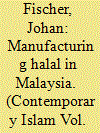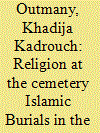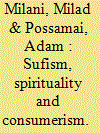|
|
|
Sort Order |
|
|
|
Items / Page
|
|
|
|
|
|
|
| Srl | Item |
| 1 |
ID:
145665


|
|
|
|
|
| Summary/Abstract |
This article presents the findings of a recent research project which sought to answer the question, ‘in what ways does being a Muslim hafiz/a affect the everyday work, life and perceptions of a representative sample of being huffaz?’ The project was itself a sequel to a previous piece of fieldwork which examined the dynamics of a boys’ hifz class in a north-east London mosque. Following, by way of background, a commentary on each of the four terms used in the article title—‘hifz’, ‘English Muslim community’, ‘hidden’ and ‘Olympians’—the value and methodology of the research project is explained. Four aspects of the research findings are then outlined: implications for the quality and style of daily living, keeping the Qur’ān fixed in memory, the central importance of Ramadan in the lives of huffaz and points of difference and contestation. The study ends with some concluding remarks concerning how the research already carried out in this field might be developed further, both more specifically (relating to the life and work of English huffaz) and more generally (relating to the place of textual memorisation and recitation both across religious traditions and within western and other cultural practice).
|
|
|
|
|
|
|
|
|
|
|
|
|
|
|
|
| 2 |
ID:
145664


|
|
|
|
|
| Summary/Abstract |
Drawing on data from 30 in-depth interviews with prominent Australian Muslim leaders, this paper argues that the concept of identity could bring together and explain the sources and dynamics of struggles over the Muslim leadership in Australia. The paper will demonstrate that identity definition lies at the centre of competitions and contestations around the Australian Muslim leadership. From within, sub-groups such as Muslim youth and Muslim women contest the incumbent leadership, striving to impose a new image and definition of the Muslim identity in the Australian public sphere. From without, stakeholders such as the Australian government and the Australian media influence the dynamics of the Muslim community leadership by supporting a group of Muslim leaders over others—a process aiming to define who Muslims are in the Australian context.
|
|
|
|
|
|
|
|
|
|
|
|
|
|
|
|
| 3 |
ID:
145667


|
|
|
|
|
| Summary/Abstract |
In the Western political science literature of the late 20th and early 21st century, the Middle East has often been described, not only as authoritarian, but also as impervious to democracy. Institutional, structural, and cultural explanations were advanced to explain this democracy deficit. This article will debunk the notion that democratization in the Middle East is limited by entrenched Muslim and/or Islamist views on social and sexual mores, and on women’s political and social rights. Indeed, the events of the so-called “Arab Spring” have shown that the desire for democracy is the reason for the overthrow of several regimes in the Arab world. These popular-led regime changes were triggered by a desire for political and social reform. The main actors behind the Arab uprisings have been Arab youths and women, with women actively participating in anti-regime demonstrations and sometimes paying the price for that participation with their bodies. Using examples mainly from North Africa, the article will show three trends that have emerged in the region since the 1990s: changes in the law proposed by grassroots secular activists, the work of Muslim feminists, and that of Islamist female activists in the transformation of women’s roles in the Middle East that counter the claim that Islamic views on gender equality limit the emergence of democracy.
|
|
|
|
|
|
|
|
|
|
|
|
|
|
|
|
| 4 |
ID:
145666


|
|
|
|
|
| Summary/Abstract |
In Arabic, halal literally means ‘permissible’ or ‘lawful’. Halal is no longer an expression of an esoteric form of production, trade and consumption, but part of a huge and expanding globalized market in which certification, standards and technoscience play important roles. Over the past three decades, Malaysia has become a world leader in the global expansion of halal markets. This has come about in large part because the state and government of Malaysia have taken on the role of halal-certifying authority within the country. In effect, it has certified, standardized and bureaucratized halal production, trade and consumption. Based on fieldwork in Malaysia, this article explores how manufacturing companies understand and practise halal certification, standards and technoscience. I argue that while existing studies of halal overwhelmingly explore micro-social aspects such as the everyday consumption among Muslim groups, ‘the bigger institutional picture’ that frames such consumption production and regulation are not well understood. By studying halal production, I provide an ethnography of the overlapping technologies and techniques of production and regulation that together warrant a product as ‘halal’ and thereby help to format the market.
|
|
|
|
|
|
|
|
|
|
|
|
|
|
|
|
| 5 |
ID:
145669


|
|
|
|
|
| Summary/Abstract |
Death, dying, and burial are not only matters restricted to the experiences and emotions of an individual, but also social events. The rituals that accompany these events are central to the identities and meanings that groups construct for themselves. They can be viewed as windows that open out onto the ways societies view themselves and the world around them (Gardner, Journal of Ethnic and Migration Studies 24: 507–521, 1998). One of the themes this article takes up is that of the enforcement of legal and religious regulations with regard to death and burial among Muslims in the Netherlands and Belgium. If the practice of burial rituals and regulations is used as a “window,” this opens the way to make an elaboration of the established fact that the choice of where to be buried is not only a matter of being well informed about all the practical, legal, and religious possibilities and impossibilities. It is also (or maybe more so) a matter of how Muslims view themselves and the society of which they are part.
|
|
|
|
|
|
|
|
|
|
|
|
|
|
|
|
| 6 |
ID:
145668


|
|
|
|
|
| Summary/Abstract |
This article is a comparative study of two well-known Sufi orders, the Khaniqahi (Nimatullahi) and Haqqani (Naqshbandi). This is a preliminary work that draws on in-depth qualitative interviews to examine the process of self-representation and localisation of Sufism in Australia. Despite the fact that these Sufi orders each have established global networks and cyberspace presence, they also demonstrate strong local identities and indications of adaptation and appropriation. Recognised Sufi orders have historically operated through a complex local social network, often with links into local politics. This initial study, based on fieldwork analysis across Sydney and Melbourne, offers insight into the changing attitude of two contemporary Sufi orders of Australia on issues to do with religion, spirituality, consumerism and westernisation.
|
|
|
|
|
|
|
|
|
|
|
|
|
|
|
|
|
|
|
|
|